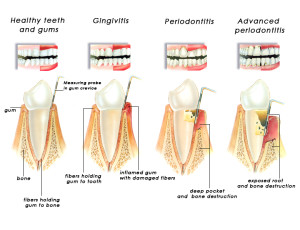Let’s not jump into any scary overwhelming research, instead let’s re-jog the memory; Gum Disease (Periodontal Disease) begins as gingivitis which is the mildest form of periodontal disease. Gingivitis is often caused by poor oral hygiene and is most likely reversible with professional treatment and taking steps to look after your mouth.
What diseases have been linked to Gum Disease?
- Diabetes
- Heart disease
- Stroke
- Premature births or low-birth weight babies
What causes Gum Disease?
The short answer is bacteria. These bacteria combined with mucus and other particles are continually form a colourless “plaque” on your teeth. Brushing and flossing twice a day helps to keep the plaque under control and with it the likelihood of gum disease. Plaque if not removed forms “tartar” which cannot be cleaned by simply brushing and flossing. Professional cleaning by a dentist or dental hygienist can however remove the tartar but it is best not to reach this stage!
What are the symptoms of Gum Disease?
- tender or bleeding gums (first sign of gum disease setting in!)
- getting longer in tooth sign of bone loss (advanced stages of Gum disease)
- Regular bad breath
- Red or swollen gums
- Loose teeth
- Sensitive teeth
Any of these symptoms may be a sign of a serious problem, which should be checked by a dentist.
The problem with Gum disease is it is generally painless and is easy to go unnoticed! The good news is gum disease is easily treated and kept under control through regular visits to see the dental hygienist.
Below we can see the progression of damage caused by gum disease:

How is Gum Disease treated?
The objective of treatment is to control the infection. The number and type of treatment will vary, depending on how advanced the gum disease has become. Any type of treatment requires that the patient keep up good daily care at home. The doctor may also suggest changing certain behaviours, such as quitting smoking, as a way to better improve the outcome of treatment.
How can I keep my teeth and gums healthy?
- Brush and floss your teeth twice a day (with a fluoride toothpaste).
- As an alternative to flossing you can use interdental brushes to get into those small gaps between teeth
- Visit a hygienist routinely for a check-up and professional cleaning (6 month check and a 12 month active maintenance)
- Don’t smoke (as hard as it is, it does improve the likelihood of not getting gum disease)

What do you think? Share your thoughts...
You must be logged in to post a comment.